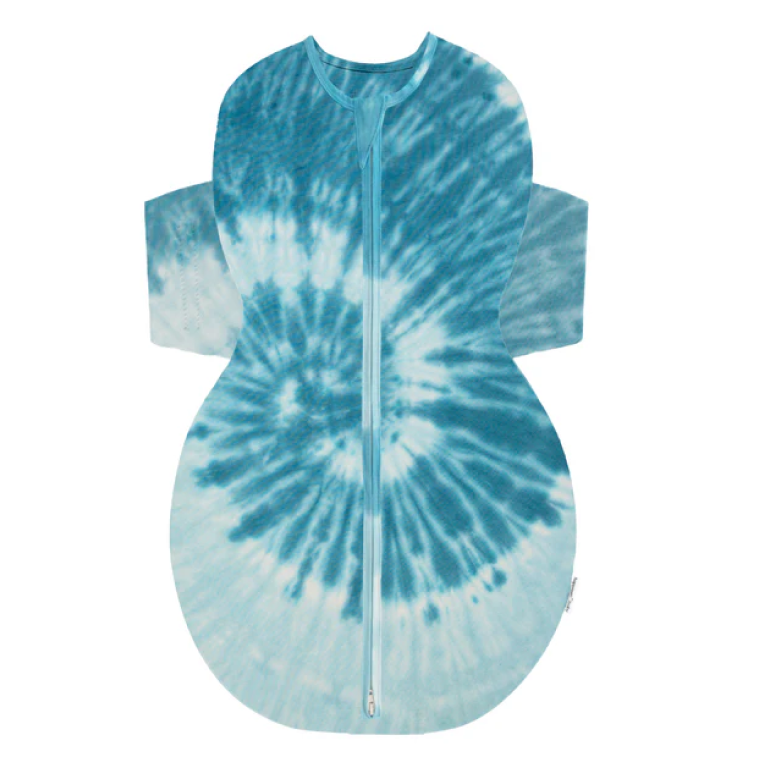PARENTS
The Subtle Signs a New Mom Might Be Struggling—and What You Can Do
Therapist Molly Nourmand shares red flags loved ones should watch for—and meaningful ways to help a new parent thrive.

Written by
Happiest Baby Staff

This post was guest authored by Molly Nourmand, LMFT and founder and Clinical Director of Life After Birth. (Learn more about how Molly turned her postpartum pain into a lifeline for other moms!)
The most frequently asked question I get is, “Is this normal?” When answering, I often refer to Matrescence which is “the term used to describe the complex physical, psychological, and emotional transition into motherhood, encompassing the profound changes a woman experiences as she becomes a mother. It's a developmental process, likened to adolescence, where a woman's identity, body, and relationships undergo significant shifts. This journey can begin during pregnancy, extend through the postpartum period, and continue as a mother evolves alongside her child.”
So, understanding this normal developmental process will help determine if someone needs extra emotional support or not. Lack of functioning (for example: brushing your teeth, driving a car, leaving your house) is what often distinguishes a normal transition into motherhood from a perinatal mood and anxiety disorder (PMAD). Recognizing early signs that a new parent might need professional help is crucial.
What are signs a parent may need extra support or professional help?
The transition into parenthood is often overwhelming, and while some stress is expected after birth, certain behaviors and symptoms may indicate deeper struggles such as postpartum depression, anxiety, or other mood disorders. Here are some key early signs to look for:
Emotional and Behavioral Signs
- Persistent sadness or crying spells beyond the first couple of weeks (more than the typical "baby blues")
- Irritability or anger that's out of proportion or difficult to control
- Withdrawal from partner, baby, or social interactions
- Loss of interest or pleasure in activities once enjoyed
- Feeling overwhelmed or unable to cope, even with basic tasks
- Excessive worry, especially about the baby’s health or one’s parenting abilities
- Feelings of guilt, worthlessness, or inadequacy as a parent
Cognitive and Physical Signs
- Difficulty concentrating, making decisions, or remembering things
- Changes in appetite or sleep patterns—not solely attributable to caring for the baby
- Fatigue or exhaustion that doesn’t improve with rest
- Frequent headaches, stomach issues, or other unexplained physical complaints
Risk-Related Signs
- Thoughts of harming oneself or the baby (even fleeting or intrusive thoughts)
- Expressing hopelessness, or saying things like “my family would be better off without me”
- Substance use or reliance on alcohol/drugs to cope
- Refusing help or becoming overly rigid/perfectionistic about routines and caregiving
Situational Red Flags
- Lack of a support system (e.g., isolated, no trusted adults nearby)
- Recent major stressors like job loss, illness, or relationship conflict
- History of depression, anxiety, trauma, or postpartum mood disorders
- Complicated birth experience or NICU stay for the baby
How can loved ones support a mom's mental health during the postpartum period?
Supporting a new mom’s mental health during the postpartum period is one of the most meaningful things partners and loved ones can do. It goes beyond helping with baby care—it’s about emotional presence, practical help, and knowing when to encourage professional support.
First of all, education and preparation ahead of time is ideal (e.g. creating a postpartum plan), especially if the birthing person has a history of:
- A personal or family history of depression, anxiety or other mental illnesses
- A history of infertility treatment or miscarriages
- Severe mood issues around the time of your menstrual period or premenstrual dysphoric disorder
- Medical complications during the pregnancy
- Financial or relationship stressors
- Limited emotional support
Here’s how partners and loved ones can provide strong support:
1. Be present and emotionally available.
- Listen without judgment. Let her talk about how she feels without trying to “fix” it right away.
- Validate her experience. Say things like, “It’s okay to feel this way,” or “You’re not alone.
- Watch for signs of emotional withdrawal, sadness, or anxiety and gently check in.
2. Share the load.
- Take on your share—or more—of the household and baby duties. For example: diaper changes, feedings (bottle or pumped milk if applicable), cooking, cleaning.
- Let her rest. Protect her sleep whenever possible, especially in the early weeks.
- Be proactive. Don’t wait for her to ask—look for what needs to be done.
3. Create routine and structure.
- Help set a rhythm that allows for self-care time, naps, and meals.
- Support her in establishing healthy habits, like getting outside or eating well.
- Avoid overscheduling or too many visitors—respect her need for downtime.
4. Stay informed.
- Learn about postpartum depression, anxiety, and other mood disorders so you can spot signs early. (The Postpartum Partner is a helpful resource)
- Be aware that mood issues can show up weeks or even months after birth.
5. Encourage connection and professional help.
- Support her in staying connected with friends, family, or support groups.
- Gently suggest professional help if you notice concerning signs. Say: “I’ve noticed you seem really down lately. Would it help to talk to someone about it?”
- Offer to help arrange appointments or watch the baby during therapy sessions.
6. Reassure and affirm her worth.
- Tell her she’s doing a great job—even when she doubts herself.
- Be patient with mood swings or emotional moments. Hormones and sleep loss are real factors.
- Show affection. Small gestures like hugs, kind words, and acts of care go a long way.
About Molly Nourmand
![[object Object]](https://cdn.sanity.io/images/301lhh0a/production/14f5b208e9ea577b558a2a6a23983dfcd3133ce5-160x240.jpg?w=384&auto=format&q=75&fit=max)
Molly Nourmand, LMFT, is a psychotherapist and mother behind Life After Birth. She founded Life After Birth in 2017 following her own experience with birth trauma and postpartum depression. Grounded in Psychodynamic Theory and enriched by her training in yoga, meditation, Somatic Experiencing, and Perinatal Mental Health, she leads process-oriented support circles, 1:1 therapy, retreats, and mentorship to guide birthing individuals through the transformative journey of early parenthood.
Disclaimer: The information on our site is NOT medical advice for any specific person or condition. It is only meant as general information. If you have any medical questions and concerns about your child or yourself, please contact your health provider.
SHARE THIS ARTICLE
MOST LOVED
Sleepytime Sidekicks












